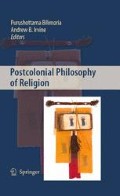If we are to have a relational view of taxonomy and discourse — the explosive myth of contextualization and positionality — then ‘sites’ should also bear out their relative differences. There are ‘in sites’ and there are ‘out sites’ (ones you see and ones you don't), and borderzones in-between. The present chapter is located in this unchar-tered borderzone, though its critique is intended to be ‘radical’ without the frothy ambiguities, equivocations, hybrid-speakages more usually than not associated with the two ‘sites’ I wish here to bring into confrontation. What are these sets of ‘sites’?
First though a brief remark on the term ‘sites’ or ‘site’ (in the singular). The Latin root ‘situ’, semantically linked to the Greek ‘topos’, denotes a fixed position where an object, structure or tissue is placed or where something occurs. In geographical and architectural usage its reference is usually to the place, space, location, setting or situatedness of a very particular or distinctive structure or tissue in an open-ended plot that also marks it off from similar ‘site’ elsewhere. If another structure is erected or imposed in that particular spot then the site is said to have been erased. There could be related parallel or deeper, invisible structures or ‘locale’, (the session next door) that remain out of sight (out of this site, i.e. in another place). In other contexts, the latter may acquire connotations of care and securedness (home, community, nation) the sacred and mythical (land, ritual altar, location of the temple as ikos), moral or ethical (‘life-world’, ‘form of life’, dharma as that which holds), surrogate or virtual (dreamspace, doughnut hole, cyberspace, web-sites), or quasi-mystical (Heidegger's ‘locale of the truth of Being’, totality, absence), cosmological (dharmakaya, infinite empty space or nothingness), even metaphysical (Omni-Presence, Void or Absolute Nothingness, sūnyatā).
After the beginning there appeared some stranger texts
West's Orientalism objectified the corpus's otherness
And Modernity's philology rendered their syntax as his own;
Thence followed the postmodern disruption of the aporia
Re-citing the alterity and the ousia of the Other's face;
But it awaited the hybrid-angst of postcolonialism's site
Whence the interrupted texts begin miming an-other meaning.
Authorless Revelation
Access this chapter
Tax calculation will be finalised at checkout
Purchases are for personal use only
References
Ahmad, Aijaz. (1992). In Theory: Classes, Nations, Literatures. London: Verso.
Al-Azmeh, Aziz. (1993). Islam and Modernities. London: Verso.
Anderson, Pamela Sue. (2004). Feminist Philosophy of Religion. London: Routledge.
Appadurai, Arjun. (1997). Modernity at Large. Minneapolis, MN: University of Minnesota Press.
Appadurai, Arjun. (2006). Fear of Small Numbers. Durham, NC: Duke University Press.
Bhabha, Homi. (1994). The Location of Culture. London: Routledge.
Bharucha, Rastom. (1998). Economic and Political Weekly. Vol. XXXII, No. 4, January 24–30, pp. 167–181.
Bilimoria, Purushottama. (1999). A Problem for (Onto-theos) Radical Pluralism. In Philosophy of Religion: Toward a Global Perspective, edited by GE Kessler, pp. 575–582. Belmont, CA: Wadsworth Press.
Bilimoria, Purushottama, Renuka Sharma and Joseph Prabhu (eds.). (2007). Indian Ethics Classical and Contemporary. Aldershot: Ashgate; New Delhi: Oxford University, 2008.
Bilimoria (2007a), Dismantling normativity in Indian ethics — from Vedic altarity to the G ītā's alterity’, in Youru Wang (ed.), The Ethical Dimension And Deconstruction Normative Ethics In Asian Traditions, NY/London: Routledge, pp. 33–74.
Bilimoria (2007b). Transglobalism of Self-Exiled Hindus: The Case of Australia. Religion Compass, Vol. 1, No. 2, pp. 305–328.
Bilimoria (2008a), Dialogic Fecundation of Western Hermeneutics and Hindu Mīmām. sā in the Critical Era. In R. Sherma and A. Sharma (eds.) Hermeneutics and Hindu Thought Towards a Fusion of Horizons. Dordrecht: Springer, pp. 43–76.
Bilimoria, Purushottama (2008b). Śabdapramāna: Word and Knowledge as Testimony in Indian Philosophy. New Delhi: D K Printworld.
Braidotti, Rosie. (1997). Nomadic Subjects: Feminist Postmodernism as Antirelativism. Justice and Democracy: Cross Cultural Perspectives, edited by Ron Bontekoe and Marietta Stepaniants. Honolulu, HI: University of Hawaii Press.
Cahoone, Lawrence (ed.). (1996). From Modernism to Postmodernism an Anthology. Cambridge, MA: Blackwell.
Caputo, John D. (1997). The Prayers and Tears of Jacques Derrida: Religion Without Religion. Bloomington, IN: Indiana University Press.
Chakrabarty, Dipesh. (2000). Provincialzing Europe: Postcolonial Thought and Historical Difference. New York: Princeton University Press.
Chakrabarty, Dipesh. (2002). Habitations of Modernity: Essays in the Wake of Subaltern Studies. Chicago, IL: University of Chicago Press.
Chakrabarty, Dipesh (ed.). (2007). From the Colonial to the Postcolonial: India and Pakistan in Transition. New York: Oxford University Press.
Fanon, Franz. (1990). The Wretched of the Earth. New York: Grove Press.
Gandhi, Leela. (1998). Postcolonial Theory: An Introductory Text. Sydney: Allen & Unwin.
Grange, Joseph. (1997). In Justice and Democracy: Cross Cultural Perspectives. Bontekoe, Ron and Marietta Stepaniants. (eds.) Honolulu: University of Hawaii Press.
Habermas, Jurgern. (1985). The Philosophical Discourse of Modernity. Cambridge, MA: MIT Press.
Lal, Vinay. (1995–1996). Plural Worlds, Ashis Nandy and the Post-Columbian Future Multiple Selves. Special Edition of Emergences 7/8, Group for Composite Studies, UCLA.
McCulloch, Jock. (1996). Colonial Psychiatry and the African Mind. Melbourne: Cambridge University Press.
Nandy, Ashis. (1998). Return from Exile. Delhi: Oxford University Press.
Rorty, Richard. (1989). Contingency, Irony and Solidaarity. Cambridge/New York: Cambridge University Press.
Rorty, Richard. (1995). Questions to Emmanuel Levinas, Yale French Studies, No. 87.
Rosenau, Pauline Vaillancourt. (1992). Postmodernism and the Social Sciences Insights, Inroads and Intrusions. Princeton, NJ: Princeton University Press.
Sharma, Renuka. (1993). Understanding the Concepts of Empathy and Its Foundation in Psychoanalysis. Lewiston, NY: Edwin Meller.
Sharma, Renuka. (1998). The Other Revolution: Ngo and Feminist Perspectives from South East Asia in Naari Studies in Gender, Culture and Society: East; West, No. 3. Delhi: Indian Books Centre.
Spivak, Gayatri Chakravorty. (1999). A Critique of Postcolonialism. Cambridge, MA: Harvard University Press.
Author information
Authors and Affiliations
Corresponding author
Editor information
Editors and Affiliations
Rights and permissions
Copyright information
© 2009 Springer Science+Business Media B.V.
About this chapter
Cite this chapter
Bilimoria, P. (2009). Postcolonial Discontent with Postmodern Philosophy of Religion. In: Bilimoria, P., Irvine, A.B. (eds) Postcolonial Philosophy of Religion. Springer, Dordrecht. https://doi.org/10.1007/978-90-481-2538-8_17
Download citation
DOI: https://doi.org/10.1007/978-90-481-2538-8_17
Publisher Name: Springer, Dordrecht
Print ISBN: 978-90-481-2537-1
Online ISBN: 978-90-481-2538-8
eBook Packages: Humanities, Social Sciences and LawPhilosophy and Religion (R0)

